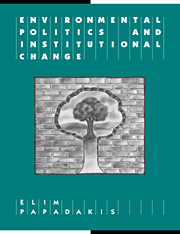Book contents
- Frontmatter
- Contents
- List of Tables and Figures
- Preface and acknowledgements
- Abbreviations
- Part I Introduction
- Part II Political Institutions, Innovation and Social Change
- Part III Political Organisations and Adaptation
- 8 Inertia and innovation
- 9 Missed opportunities: The Liberal and National Parties
- 10 Leading the charge for the green vote: The Australian Labor Party
- 11 Fundamentally green: The Australian Democrats
- 12 Overcoming institutional inertia
- Part IV The Media, Agenda Setting and Public Opinion
- Part V Conclusion
- Appendix: Codes used in tables 9.1 to 12.1
- Notes
- References
- Index
8 - Inertia and innovation
Published online by Cambridge University Press: 18 December 2009
- Frontmatter
- Contents
- List of Tables and Figures
- Preface and acknowledgements
- Abbreviations
- Part I Introduction
- Part II Political Institutions, Innovation and Social Change
- Part III Political Organisations and Adaptation
- 8 Inertia and innovation
- 9 Missed opportunities: The Liberal and National Parties
- 10 Leading the charge for the green vote: The Australian Labor Party
- 11 Fundamentally green: The Australian Democrats
- 12 Overcoming institutional inertia
- Part IV The Media, Agenda Setting and Public Opinion
- Part V Conclusion
- Appendix: Codes used in tables 9.1 to 12.1
- Notes
- References
- Index
Summary
The tension between innovation and tradition, between new ideas and established institutional practices, pervades most areas of policy-making. The evolution of policies on the environment serves to demonstrate that, despite this tension, established organisations are capable of responding to discoveries about environmental problems and to new intellectual paradigms. The policies also demonstrate the capacity of political parties both to influence, and to be influenced by, public opinion (see chapters 9 to 16). The pace of responses by established political organisations has varied immensely. In some instances, there has been a huge effort by governments to shift public opinion in support of new, radical measures to tackle problems. In others, changes have been slow despite the obviousness of the problem.
For instance, as early as 1922 the International Council for Bird Preservation was worried about oil pollution of the oceans. On the face of it, the British government responded quickly by enacting legislation against oil pollution in the same year. In the early 1950s an important discovery was made that oil being poured out of oil tankers into the ocean was the main cause of pollution at sea. At a meeting organised by the British government in 1954, thirty-two countries tried to promote an International Convention for the Prevention of Pollution of the Sea by Oil. After four years, the agreement had been ratified by only some of these countries. Its application was limited, and it faced further resistance from shipping interests, particularly in the USA.
- Type
- Chapter
- Information
- Environmental Politics and Institutional Change , pp. 73 - 80Publisher: Cambridge University PressPrint publication year: 1996

